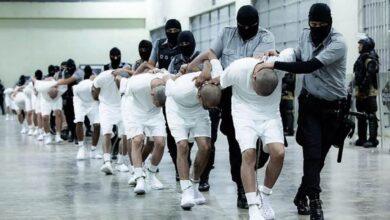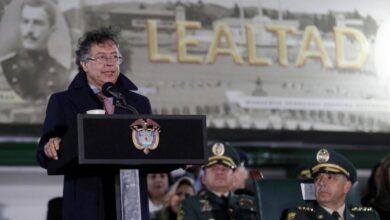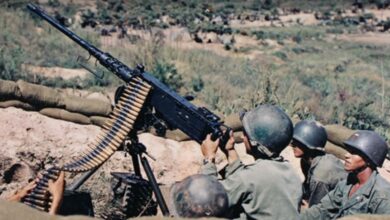War in Ukraine: What will Happen to Russia if the Wagner Group Decides to Leave the Conflict?
The rebellion of the Russian paramilitary group sparked some theories about the future of the war in Ukraine. How important is the Wagner Group for Russia's intentions in this war?.

Photo: Reuters
LatinAmerican Post | Christopher Ramírez Hernández
Listen to this article
Leer en español: Guerra en Ucrania: ¿Qué pasaría con Rusia si el Grupo Wagner decide dejar el conflicto?
The Wagner mercenary group generated controversy amid the Russia-Ukraine war on 24 June, posing a clear challenge to Russian President Vladimir Putin with an operation inside Kremlin (Russian government)-controlled territory.
Led by their leader, Yevgeny Prigozhin, this paramilitary army came within 200 kilometers of Moscow after crossing from Ukraine (where they have a base) and taking almost total control of Russian military installations in Rostov-on-Don, a city in southeastern Russia.
The rebellion did not last long, and with the mediation of Belarusian President Alexander Lukashenko, Wagner decided to withdraw the advance toward Moscow and renounce the military operation inside Russia.
Although Prigozhin declared that his aim was not to stage a military coup but to carry out a "march of justice," motivated by the growing confrontation and cross accusations with Russia's top military commanders, these statements had no validity for Putin.
According to Putin, the Wagner group's actions can be described as a "stab in the back." Such was Putin's anger that he assured the Russian people that he would punish all Wagner members who had "betrayed" Russia. Ultimately, an agreement was reached, which must still be fulfilled.
What is the Wagner Group?
During the war between Ukraine and Russia, which has been raging for more than 16 months, the official forces of each country are not the only ones involved in the conflict. The Wagner Group considered a paramilitary force at the service of the Kremlin, is said to have 'around 50,000 fighters in Ukraine and has become a key component of the invasion', according to statements by the UK Ministry of Defence in January.
However, this is not the first time this group has represented a crucial armed wing for Russia. According to experts, Wagner can be seen as a mercenary company that for several years acted in the shadow of the Kremlin in areas of the world where Russia showed some interest (political or economic) but where it could not send its army to avoid international disputes such as the one it is currently facing with Ukraine.
According to records, Wagner was active in Africa and the Middle East, specifically Mali, Sudan, Syria, the Central African Republic, and Libya.
It might interest you: Ukraine: This is the Wear and Tear of the Russo-Ukrainian War After 16 Months of Conflict
What would Happen if the Wagner Group Withdrew from the War?
Although there was no great bloodshed in the middle of Russian territory and the rebellion stopped, it is undeniable that friction did develop between Wagner and the Russian government that could open a new chapter in the invasion of Ukraine.
It is worth remembering that Wagner was essential in several moments of the war, such as the capture of Bakhmut in eastern Ukraine, in which they were even more important than the Russian army itself.
However, during the battles in Bakhmut, tensions between the paramilitary group and the official Russian forces were already beginning to be felt, with Yevgeny Prigozhin demanding that the army distribute new weaponry to Wagner, according to the Institute for the Study of War because the Kremlin wants to undo its independence and force the paramilitary group to join the Russian Armed Forces at any cost.
However, this has raised a question among international organizations and experts: what would happen if Wagner disappeared from the radar as it is known today? The answers are almost the same: it would change warfare as we know it today significantly because it exposes Putin's shortcomings and his authority over the forces (public or private) in his service.
Speaking to the BBC, Vladimir Gelman, a professor at the University of Helsinki (Finland), said that "in today's Russia, Wagner is outside the control of the state and incidentally began to compete with it and even tried to dictate terms to it," the latter point being crucial for the future of the invasion.
Prigozhin may not have taken a clear stance on ending the war in Ukraine, but Wagner's short-lived rebellion against the Russian government may be a sign that this is what he intends to do. In that sense, should Wagner withdraw from the conflict, it would not only leave the Russians without an important armed wing but also seek to take advantage of the situation.
Thus, one primary beneficiary of the whole situation would be Ukraine. With Wagner out of Ukrainian territory, Russia would have two problems: the neighboring country's armed forces countering the invasion and the defense within its region against a second possible rebellion by the paramilitary groups that have already shown their displeasure with Putin.
"The biggest beneficiary of this distraction is Ukraine, with Russia losing its war in Ukraine and opening a second front in its territories," said Alexander Vindman, former director for European affairs at the US National Security Council, as quoted in Foreign Policy magazine.
Indeed, some Ukrainian government spokespersons, such as Oleksy Danilov, secretary of Ukraine's National Security and Defence Council, have seen this as a triumph, which signals the "beginning of the end of the war."
"The war will end as it began: within the Russian Federation (…) The process has begun," Danylov was quoted as saying by Euronews.
And the thesis is plausible since even the town of Rostov itself celebrated Wagner's rebellion. On social networks, the happiness of this event is noticeable in the city, with its inhabitants saying a hero's farewell to the paramilitary insurgents after the agreement with the Kremlin.
Will this rebellion be the beginning of the end, not only of the war but of Putin's long rule in the Russian Federation?





